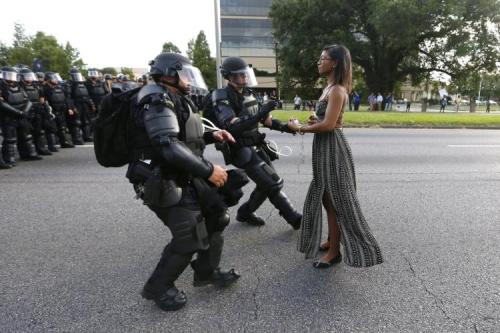We live in a time that encourages us to erase our history. Our focus is on moving forward, making progress, all the while we congratulate ourselves for how far we’ve come.
We live in times where we look to “disrupt” as a means of “innovating.” Of creating space for newness.
All the while we do so without fully understanding the forces at work that created the need for change in the first place.
We do so without understanding the choices that our history gives us clues to.
In a recent article in the Detroit Free Press, the current Emergency Manager for Detroit Public Schools, Judge Stephen Rhodes (who calls himself a “Transition Manager” as means of avoiding the historical failure of “Emergency Manager”- see how that works?), along with interim Superintendent Alycia Meriweather, wrote an op-ed, “Focus on Fresh Start for Public Education in Detroit, Not Blame for the Past,” asking us to wipe the slate clean, forget the past, and move forward in order to do what’s best for kids.
“As a community, we can choose to focus our time and energy on questions such as who bears the responsibility for the problems of the old Detroit Public Schools, whether it was necessary for the Michigan Legislature to launch a new school district to solve those problems, or whether the Legislature should have done more.
As leaders of the new school system, however, we choose to focus on the task of creating the best school system that we can for the city of Detroit. We make that choice because it is in the best interests of the students. All other questions are merely distractions from the goal of excellence in academics to which we aspire. We ask the community to join us in that choice.” (Emphasis added)
As a superficial gesture, I get it. We all want what’s best for kids. Let’s move forward as way of doing that.
However, it raises so many questions that need to be asked. And to call them distractions displays a scary level of callousness for those who have been deeply harmed along the way.
For instance, let’s start with how we define community, who gets to define it, and who has a voice within it.
If by community, we mean a group of people involved in having a voice in democratic decision making, then you are erasing the fact Detroit voters haven’t been represented by a school board since 2009.
Should we forget that?
Of course, the new legislative package that allows for the fresh start that Rhodes refers to will have a newly elected school board. So there’s that. But, “A finance review commission, established after the city’s bankruptcy, would be expanded to provide oversight of the school district, which has been run by a series of state-appointed emergency managers since 2009. “
In other words, there will be a degree of oversight that exists in no other school district in the state of Michigan. Clearly what is meant by community means a community that needs oversight. Control. Surveillance.
Should we forget that?
If we forget history, and just move forward, then we can rest assured that the status quo remains intact. History, you see, is messy. And it may not make us look so good.
In fact, history can be pretty ugly.
And the recent history in Detroit Public Schools, very simply, is part of a long history that involves the erasure of black voices and black bodies. These are the ones in need of oversight. Control. Surveillance. I know, this sounds pretty serious. And it can be scary to bring up race. But trust me, it’s way better than avoiding it. (So stay with me.)
Instead, we go through all kinds of gyrations. Detroit, a city that is 80% black, has not had any voice in school governance since 2009. It has been run by the state under emergency management. And yet, the heavily Republican Michigan House calls the most recent bill that allows for Rhodes’ “fresh start” a “bailout” for Detroit rather than the state. This is a common headline, “Michigan Legislature Oks $617 Million Bailout for Detroit Schools.”
What?
The context of the article points out that, “The financially and academically ailing 46,000-student Detroit Public Schools has been managed by the state for seven years, during which it has continued to face plummeting enrollment, deficits and, more recently, teacher sick-out protests.” (Emphasis added)
And yet, this is a “bailout” for DPS?
We’ve already forgotten that we are bailing out the state, not DPS.
But the headline leaves the old narrative intact: We are coming to save those poor black people who can’t run their own district. In , Democracy in Black: How Race Still Governs America’s Soul, scholar Eddie Glaude puts it this way: “The ritual act of disremembering became a ritual of expiation: the sins of our racial past gave way to an emphasis on individual merit and responsibility. Racial inequality was not seen as the result of deeply ingrained habits, racist policies, or actual discrimination but, rather, as the result of culture of pathology, which produced bad, irresponsible black people.” In the absence of the context of actual history, we are left only with the narrative that the people of Detroit are the problem, who thus created the need for a “bailout.” Structural, systemic causes are unable to be accounted for or addressed. So it becomes a people problem. A Detroit people problem. A black people problem.
See how that works?
We’ve just disremembered the facts and the freed ourselves from the highly racialized context of these facts. We’ve erased ourselves from responsibility for this mess. We’ve forgotten a history of disinvestment in infrastructure, white flight, and the abandonment of those left behind.
Glaude writes about what he calls the “value gap.” This is the gap between the value that we place on white lives, versus the value that we place on black lives. He says that, “We talk about the achievement gap, we talk about the empathy gap, we talk about the wealth gap, and the value gap is this: the belief that white people matter more than others. And to the extent to which that belief animates our social arrangements, our political practices, our economic realities, under different material conditions, as long as that belief obtains, democracy will always be in abeyance in this country.” (Emphasis added)

This is a story that is writ large in the history of Detroit. And one that is fundamental to the disinvestment and the abandonment of the children of Detroit, in spite of the thrown bone of $617 million “bail out” created by the state of Michigan. A “bailout” that as Rep. David Knezek says, “assures failure.”
Should we forget that?
But most egregious is the way that the voices of the Detroit Black Caucus were erased in the vote proceedings for this “bail out.” These are the people who are elected to give voice to those directly affected by the passing of the bill. And yet, in an embarrassing and concretely literal example of white supremacy, the caucus was intentionally ignored in its pleas to speak to the legislative body as the vote was about to be taken. “As the House debated legislation pertaining to the saving of Detroit Public Schools, Democrat Leslie Love from Detroit was refused permission to speak. Even as her colleagues amplified her request, at one point chanting, she was ignored.” (For a chilling and heartbreaking video, please, please see this from Eclectablog.)
I suppose we should forget that too.
I suppose we should forget the erasure of these black voices so that we can start fresh.
Historian Kahlil Gibran Muhammad says, “…my whole point in telling the story is that we always have a choice. And the choice is not to be prisoner to the past, not to be prisoner to the existing myths that shroud us, but to make different choices. Because looking back, the benefit and the beauty of history and hindsight is to see the roads not taken. And there are too many roads that we’ve chosen not to take consistently in this country — yet, self-righteously, as if we’re more evolved, better, faster, more efficient, you fill in the blank.”
We can choose to move incredibly efficiently on the wrong road bringing us a future we are all too familiar with, or we can pause to try to truly understand our past, and move towards something better.
We can choose to search through our history for the roads not taken.
They are abundantly available.
Like Rhodes, I want all of us to move forward too. But the way move forward is determined by our understanding of our history.
The lives of all of our children require us to have the courage needed to remember.
(Image from New York Daily News)


